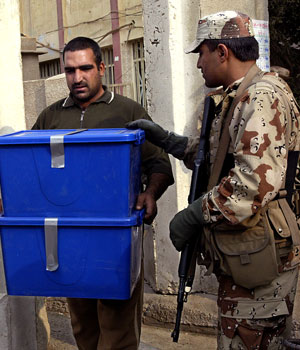
An employee of the Independent Electoral Commission in Iraq (IECI) takes out election material from a polling station in Baghdad to be transferred to the main headquarters of (IECI) in capital of the war-torn country (AFP)
BAGHDAD, (Reuters) – Millions of ballot papers were being counted and recounted on Friday as Iraqis celebrated a peaceful election that saw rebellious Sunni Arabs join in for the first time, pushing turnout close to 70 percent.
Cities were quiet on the final day of a security lockdown that has sealed borders, banned traffic and put tens of thousands of police and soldiers on the streets, backed up discreetly by U.S. troops. After preliminary counting in local centres, ballot forms were being shipped under guard to Baghdad.
Initial results may take days to emerge, and the final tally a couple of weeks, while talks on a coalition government that must bridge ethnic and sectarian divisions could last months.
Electoral Commissioner Farid Ayar told Reuters he was assuming between 10 and 11 million of 15 million eligible Iraqis voted on Thursday, putting turnout between 67 and 73 percent.
"We need a couple of days to know a precise number," he said. "Everything went well from our point of view."
Turnout in a January election for an interim parliament, boycotted by most Sunni Arabs, was only 58 percent.
No major complaints of irregularities had been received by the Commission yet, Ayar said. There were scattered instances of parties accusing officials or rivals of abuses on Thursday.
A further national count will begin in Baghdad””s fortified Green Zone government compound on Saturday and, with complaints to be dealt with too, the final allocation of the 275 seats in parliament would take at least a fortnight, Ayar said.
"It””s about two weeks or maybe more," he said. "In the first week of January we will announce the certified results."
The election for Iraq””s first full-term government since U.S.-led forces ousted Saddam Hussein in 2003 was only slightly disrupted by violence and marked the last stage of a U.S. timetable to establish democratic institutions.
Wooing Sunni Arabs dominant under Saddam away from revolt and into the political process has become a crucial part of U.S. efforts to stabilise Iraq sufficiently to allow the gradual withdrawal of the 150,000 American troops deployed there.
HORSE-TRADING AHEAD
Beaming electoral commission officials said all but six of 6,246 designated polling stations had functioned, although some had not opened on time because of security fears, resulting in long queues of voters and some shortages of ballot papers. This forced officials to extend voting by an hour in some areas.
The biggest problems had appeared to be in the Sunni Arab western desert province of Anbar, where 45 of a total of 207 polling stations were not open when voting began elsewhere.
Turnout in Anbar was negligible in January but seemed strong on Thursday as insurgents keen for a Sunni Arab voice in Baghdad vowed to protect voters against attacks from al Qaeda and other groups sworn to destroy the U.S. political project in Iraq.
Some preliminary results could filter out within days, clearing the way for a period of horse-trading among the leading blocs before a new coalition government is formed.
"Since no single party will have a majority there will be a need for a very broad-based coalition," said U.S. ambassador Zalmay Khalilzad, an important player in the process.
"There””s many other steps to come. It””s important to keep up the momentum," he told Reuters on Thursday.
Once a coalition government is formed, the first task of the new parliament will be to address Sunni Arab grievances over the constitution, passed with Shi””ite and Kurdish votes in an October referendum. Another challenge is building up Iraqi security forces so foreign troops can go home.
Informal polling by Reuters around the country showed the ruling Shi””ite Islamist Alliance still dominant in the south and their Kurdish allies controlling their northern stronghold.
But there also seemed to be strong support for former Prime Minister Iyad Allawi, a Shi””ite who heads a secular, cross-sectarian slate and has sought to split the Shi””ite vote.
Negotiations over the shape of a cabinet will offer an indication of how far the new, more inclusive parliament will be able to produce a workable government that can meet popular demands for security, prosperity and curbs on corruption.
Failure and disappointment may well spell violence from Sunni Arabs if they do not get the influence they want.
"I””m not over-optimistic," said Iraq analyst Joost Hilterman of the
International Crisis Group think-tank in Amman.
"If they don””t, they””re going to go back to what got them here in the first place, the insurgency. And that””s going to make it very difficult for American troops to leave."

An Iraqi policeman escorts an Iraqi elderly to a polling station to cast his vote in central Baghdad, 15 December 2005 (AFP)

Iraqi children take advantage of the continued security measures to play in an empty street in Baghdad, 16 December 2005, one day after more than two-thirds of Iraqi voters turned out in the election, according to first estimates (AFP)
